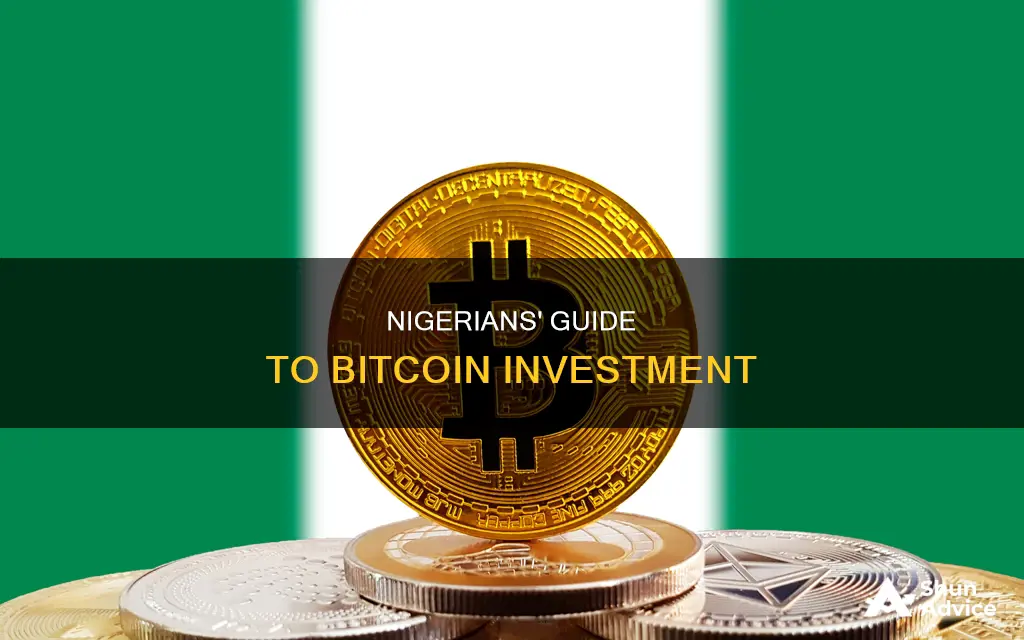
Bitcoin is the world's biggest cryptocurrency by value and is now part of our everyday lives. It is completely paperless and was created to make cross-border transactions easier. Unlike regular currency, it is not controlled by any single individual, organisation or government, but by Bitcoin users worldwide. In Nigeria, there are no laws or policies against the use of cryptocurrencies, so Bitcoin is 100% legal.
There are several ways to buy Bitcoin in Nigeria. You can use a crypto broker, a cryptocurrency trading platform, or a peer-to-peer exchange. Crypto brokers like Luno support convenient payment methods and allow users to buy crypto using fiat currencies. Trading platforms enable users to deposit fiat currencies in online wallets and then use them to purchase crypto assets. P2P exchanges allow direct negotiations between individuals and greater privacy. Popular platforms include Binance, Paxful, and Trustee Wallet.
| Characteristics | Values |
|---|---|
| Legality | Cryptocurrency is 100% legal in Nigeria |
| Investment Amount | You can start investing in Bitcoin with as low as N50 |
| Investment Platforms | Binance, Trustee Wallet, Paxful, Luno, LocalBitcoins, Bitcoin ATMs |
| Payment Methods | Credit Card, Debit Card, Bank Transfer, Cash |
| Wallet Options | Hardware Wallets, Desktop Software Wallets, Mobile Apps |
What You'll Learn

Is it legal to invest in Bitcoin in Nigeria?
Bitcoin is a digital currency that was created to make cross-border transactions easier and faster. Unlike regular currencies, Bitcoin is not controlled by any individual, organisation, or government, but by its users worldwide.
In Nigeria, Bitcoin and other cryptocurrencies are not recognised as legal tender by the Central Bank of Nigeria (CBN). In 2021, the CBN banned commercial banks in the country from engaging in any cryptocurrency transactions. The CBN's aim was to protect citizens from black market criminal and fraudulent crypto activities. However, the CBN has also acknowledged the potential benefits of cryptocurrencies, including improved financial inclusion and transparency in the country.
Despite the CBN's ban, cryptocurrencies are not illegal in Nigeria. There are no specific laws or policies against the use of cryptocurrencies in the country. In fact, Nigeria has one of the highest crypto usage rates in the world, with a transaction volume of $400 million in 2020, ranking third after the United States and Russia. The popularity of cryptocurrencies in Nigeria is driven by factors such as inadequate financial services, high inflation, depreciation of the Naira, and a young, tech-savvy population.
In response to the growing crypto adoption, the Nigerian government has taken steps to regulate the industry. In May 2022, the Securities and Exchange Commission (SEC) of Nigeria published comprehensive guidelines for cryptocurrency service providers and banking institutions on interacting with digital assets. These guidelines provide a regulatory framework for the industry, requiring crypto exchanges to obtain licenses, maintain minimum capital requirements, and implement know-your-customer (KYC) and anti-money laundering (AML) measures.
While the regulatory landscape for cryptocurrencies in Nigeria is evolving, it is important to note that buying and selling cryptocurrencies carries inherent risks. Individuals interested in investing in Bitcoin or other cryptocurrencies should educate themselves thoroughly and stay updated on the latest regulations and guidelines.
The Best Cryptocurrency Coins to Invest in Now
You may want to see also

How to choose a Bitcoin wallet
When you buy your first bitcoin, you need to decide where to put it. A Bitcoin wallet acts as an ultra-secure digital vault and as the app you use to manage your bitcoin. The best Bitcoin wallets enable you to send and receive bitcoin, trade between cryptos, discover new ways to use your bitcoin and other cryptos, get market updates and news, and even interact with smart contracts.
- Access to private keys: You should have access to your private keys, which allow you to own your bitcoin.
- Multisig (shared wallets): Multisig refers to the ability to require more than one key to authorise a transaction. This can be used to divide responsibility and control over multiple parties.
- Security: Some wallets offer two-factor authentication (2FA) as a way to add additional security to your wallet. The first 'factor' is your password, and the second 'factor' is a verification code retrieved via text message or from an app on a mobile device.
- Transaction fees: Some wallets give you full control over setting the fee paid to the bitcoin network before making a transaction, or modifying it afterward, to ensure that your transactions are confirmed in a timely manner without paying more than you have to.
- User-friendliness: Consider a wallet with an intuitive design and a logical algorithm for transactions, allowing both newbies and experienced crypto-users to use it.
- Functionality: Depending on your needs, you may want to consider a wallet that offers extra features in addition to swapping and secure storage, such as the ability to trade between cryptos, interact with smart contracts, or receive market updates.
- Anonymity: If you want to keep your identity hidden when transferring coins between wallets, you should consider an anonymous Bitcoin wallet.
- Support: Look for a wallet with good tech support and educational resources for crypto beginners.
The Ultimate Guide to Investing in Litecoin Cash
You may want to see also

How to choose where to buy Bitcoin
There are several ways to buy Bitcoin, each with its own pros and cons. Here are some of the most common methods:
- Cryptocurrency Exchanges: These are platforms that allow you to exchange fiat currency (like the Naira or US Dollar) for Bitcoin. Examples include Binance, Coinbase, Kraken, and Crypto.com. When choosing an exchange, consider the fees, security measures, and payment options offered. Some exchanges may also have restrictions on the amount of Bitcoin you can purchase.
- Brokerages: Services like eToro allow you to buy Bitcoin through their platform. Research the fees and features offered by different brokerages before choosing one.
- Bitcoin Wallet Apps: Apps like the Bitcoin.com Wallet app let you buy and store Bitcoin in one place. Make sure to research the security and privacy features of any wallet app before downloading it.
- Peer-to-Peer Trading Platforms: These platforms, such as LocalBitcoins, allow users to buy and sell Bitcoin directly from each other. This method can offer more privacy but may also come with higher fees and a greater risk of scams.
- Payment Services: Some money transfer apps, like PayPal, Venmo, or Cash App, now let users buy, sell, and store Bitcoin. If you're already using one of these services, this can be a convenient option.
- Bitcoin ATMs: These machines, often found in retail stores, let you buy Bitcoin with cash. However, they typically charge high fees, so be sure to factor that into your decision.
When choosing where to buy Bitcoin, it's important to consider your own needs and preferences. Compare the fees, payment options, security measures, and user reviews of each platform or service before making a decision. It's also crucial to understand the risks involved with investing in Bitcoin and to only invest what you can afford to lose.
Dragons' Den Bitcoin Code: Did They Invest?
You may want to see also

How to buy Bitcoin using a credit card
There are several ways to buy Bitcoin in Nigeria, including via a credit card. Here is a step-by-step guide on how to do it.
Firstly, you will need to choose a suitable cryptocurrency exchange platform that supports Nigerian users, such as Changelly, Quidax, Luno, Binance, or Paybis. These platforms allow you to buy Bitcoin with a credit card, and some also offer additional features like low fees, high security, and support for multiple cryptocurrencies.
Once you have selected a platform, follow these steps:
- Create an account: Sign up and create your account by providing the necessary details, such as your personal information and email address.
- Verify your identity: Most platforms will require you to verify your identity to comply with Know Your Customer (KYC) regulations. This helps ensure the security of your transactions.
- Add a payment method: Specify that you want to use a credit card as your payment method. You may also need to add your billing address.
- Fund your account: Deposit money into your account using your credit card. The minimum and maximum deposit amounts vary depending on the platform, so check their guidelines.
- Buy Bitcoin: Once your account is funded, you can purchase Bitcoin. Specify the amount you want to buy, review the transaction details, and confirm the purchase.
It is important to note that using a credit card to buy Bitcoin may come with higher transaction fees compared to other payment methods, and some experts advise against it due to the volatility of the cryptocurrency market. Additionally, always ensure you are using a secure and trusted platform to protect your personal and financial information.
Additional Tips:
- Compare fees: Different platforms may charge varying fees for credit card transactions, so it is worth comparing the fees to find the most cost-effective option.
- Research the platform: Before choosing an exchange, research its security measures, reputation, and user reviews to ensure your funds will be safe.
- Understand the risks: Cryptocurrency investments carry inherent risks due to market volatility, so be sure to understand these risks and only invest what you can afford to lose.
- Consider alternative payment methods: If you want to avoid the fees associated with credit cards, consider using other payment methods like bank transfers, which tend to have lower fees.
By following these steps and staying informed about the market, you can confidently begin your journey into the world of Bitcoin and cryptocurrency in Nigeria.
Gold Coins vs Bars: Which is the Better Investment?
You may want to see also

How to buy Bitcoin using a debit card
Bitcoin has become a popular investment option in Nigeria, with many people seeking to take advantage of its potential for high returns. One of the most convenient ways to buy Bitcoin is through a debit card, as it offers speed and ease.
Choosing a Reliable Bitcoin Exchange
First, select a Bitcoin exchange platform that is reliable and secure. Examples of exchanges available in Nigeria include Luno, Quidax, and Yellow Card. Consider factors such as transaction safety, fees, and customer support when making your choice.
Creating an Account
Once you've chosen an exchange, visit its website and sign up by providing the required information, such as your email address and password. Some platforms may require additional verification documents to comply with Know Your Customer (KYC) regulations.
Linking Your Debit Card
To link your debit card to the exchange account, look for the "Add Payment Method" or "Link Card" option. Here, you'll need to enter your card details, including the card number, expiration date, and CVV code.
Verifying Your Identity
Most Bitcoin exchanges require identity verification to comply with KYC rules. This may involve providing a scanned copy of your ID card or passport and proof of address, such as a utility bill or bank statement. This process helps ensure the security and legitimacy of transactions.
Depositing Funds
With your account set up and verified, you can deposit funds into your exchange account using your debit card. Look for the "Deposit" or "Add Funds" option, enter the amount you wish to deposit and select your debit card as the payment method. Follow the instructions provided to complete the transaction.
Buying Bitcoin
Now that you have funds in your exchange account, you're ready to purchase Bitcoin. Look for the "Buy" or "Trade" option, specify the amount of Bitcoin you want to buy or the amount of Nigerian Naira you want to spend, review the transaction details and confirm the purchase.
Securing Your Investment
After buying Bitcoin, consider transferring it to a secure digital wallet that only you control. This ensures that your Bitcoin is safe from potential hacking attempts or theft associated with the exchange. Keep your wallet credentials, such as private keys or recovery phrases, confidential.
By following these steps, you can conveniently buy Bitcoin in Nigeria using your debit card. Remember to always choose secure and reputable platforms, verify your identity, and be mindful of transaction fees. Enjoy your journey into the world of cryptocurrency!
Why You Shouldn't Delay Investing in Bitcoin
You may want to see also







